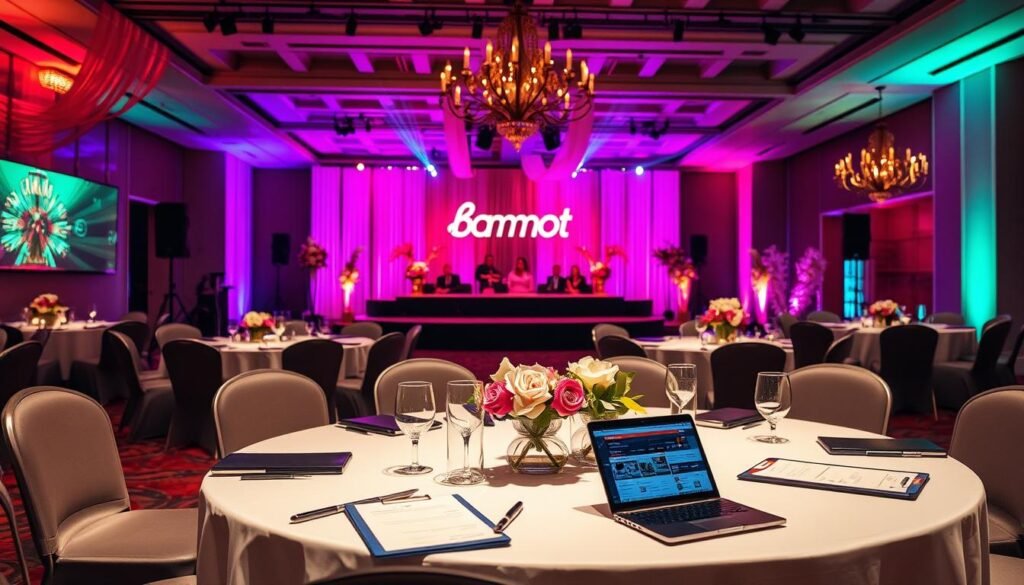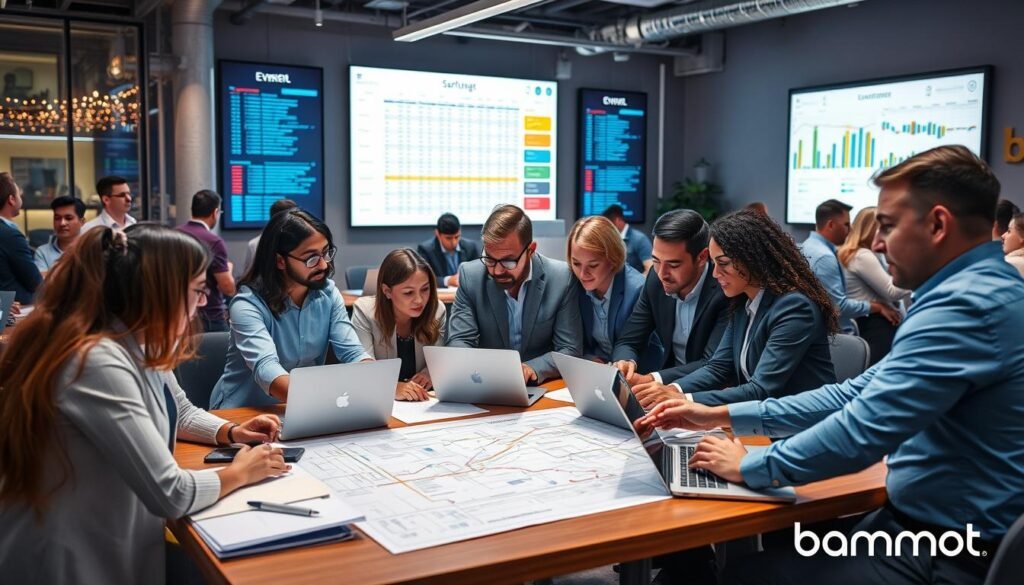תכנון אירוע מוצלח דורש תשומת לב לכל פרט. זה כל כך חשוב ליצירת חוויות בלתי נשכחות ופתרון בעיות לוגיסטיות. בין אם זה כנס גדול, השקת מוצר או גאלה תעסוקתית, תכנון אירועים יכול להיות מאתגר.
מאמר זה יעזור לך עם החלקים המרכזיים של הפקת אירועים. נעניק לך אסטרטגיות ותובנות לאירוע מוצלח. תלמד כיצד לטפל בלוגיסטיקה, תיאום וניהול כדי להרשים את הקהל שלך.
מסקנות מרכזיות
- ליצור חוויות בלתי נשכחות על ידי הבנת הקהל שלך וצרכיהם.
- לייעל לוגיסטיקת אירועים ותיאום כדי להבטיח ביצוע חלק.
- להעלות את משחק ה-ניהול אירועים שלך דרך תכנון אסטרטגי ותובנות מבוססות נתונים.
- לנצל את כוח ה-שיווק אירועים וקידום כדי לשקוף את קהל היעד שלך.
- לאמץ גישה מקיפה ל-תכנון אירועים, מהגדרת מטרות עד הגדרת הצלחה.
אמנות הייצור של אירועים
ליצור אירועים בלתי נשכחים הוא אמנות שמשלבת יצירתיות, תכנון וביצוע זהיר. כמומחים בתחום ייצור האירועים, אנו יודעים כיצד להפוך את הרעיונות שלך לחוויות בלתי נשכחות. אנו מתמקדים ביצירת אירועים שלוכדים ומעוררים את תשומת לב הקהל שלך.
יצירת חוויות בלתי נשכחות
יצירת רושם שייך לייצור האירועים. אנו מתחילים עם ערכות ייחודיות ובוחרים פעילויות ובידור מעוררי עניין. המומחיות של צוותנו מבטיחה שהאירוע שלך יהיה מצליח.
אנו מתמחים ב:
- יצירת רעיונות אירוע ייחודיים המתאימים למותג ולמטרות שלך
- עבודה עם מעצבים ואמנים מובילים כדי להפוך את החזון שלך למציאות
- שימוש בטכנולוגיה האחרונה וברכיבים אינטראקטיביים כדי לשפר את החוויה
שליטה בלוגיסטיקה ותיאום
ייצור אירועים נהדר משמעותו להקפיד על כל פרט ולתאם היטב. צוותנו מיומן בתחום לוגיסטיקת האירועים. אנו מבטיחים שהאירוע שלך יתנהל בצורה חלקה.
| תומכי לוגיסטיקת אירועים | בחירת וניהול מקום | תיאום ופיקוח על ספקים |
|---|---|---|
|
|
|
עם היכולות שלנו בייצור אירועים, לוגיסטיקה ותיאום, אנו מביאים את החזון שלך לחיים. האורחים שלך יזכרו את האירוע שלך לאורך זמן.
מעלית את משחק ניהול האירועים שלך
ניהול אירועים אפקטיבי הוא המפתח להצלחת האירוע. שליטה בתכנון אירועים וב-פעולות האירוע יכולה להביא את ניהול האירועים שלך להבחנה. בכך, תוכל להעניק למשתתפים שלך חוויות שלא ישכחו.
הנה כמה טיפים לשיפור כישורי ניהול האירועים שלך:
- קבע מטרות ברורות: הגדר את מטרות האירוע שלך באופן ברור. זה יקל עליך למדוד הצלחה ולקבל החלטות חכמות במהלך התכנון.
- שפר את היעילות התפעולית: הפוך את פעולות האירוע שלך לקלות יותר על ידי שימוש בטכנולוגיה ועבודה עם צוות מוכשר.
- קבל את הגמישות: התכונן לשינוי תוכניות אם נדרש. היכולת להסתגל יכולה לעזור מאוד כאשר עולות בעיות בלתי צפויות.
- לתת עדיפות לחוויית המשתתפים: חשוב לחשוב על מה שהמשתתפים שלך יהנו ממנו. נסה ליצור חוויה שתישאר בזיכרון, מעוררת עניין ושווה.
- לקדם תקשורת אפקטיבית: שמור על קווי תקשורת פתוחים עם הצוות שלך, ספקים ואנשי עניין. זה מבטיח שכולם יהיו על אותה עמוד.
על ידי השימוש בטיפים אלה, תוכל לשפר את כישורי ניהול האירועים שלך. תהיה מוכן לספק תוצאות מעולות באירוע הגדול הבא שלך.
"ניהול אירועים מוצלח הוא לא רק על ביצוע האירוע, אלא על יצירת חוויה שמשאירה רושם איתך."

תכנון אירוע: גישה מקיפה
התחלה עם מטרות ברורות היא מפתח לתכנון אירוע מוצלח. זה מבטיח שהאירוע שלך יענה על מטרות העסק שלך ויעשה שינוי אמיתי.
הצבת מטרות והגדרת הצלחה
ראשית, הגדר את מטרות האירוע שלך. מה אתה רוצה להשיג? האם להגביר את המודעות למותג, לקבל עוד לידים, או לחזק את הקשר עם לקוחות? מטרות ברורות מנחות את ההחלטות שלך ועוזרות למדוד את ההצלחה.
לאחר שהצבת את המטרות שלך, הגדר כיצד תדע אם הצלחת להשיגן. זה עשוי להיות דרך השתתפות, לידים, כיסוי בתקשורת, או כמה שמחים המשתתפים היו. יש לך מטרות ברורות שמאפשרות לך לעקוב אחר הצלחת האירוע שלך ולשנות אותו אם נדרש.
| מטרת האירוע | מדד הצלחה |
|---|---|
| להגביר את המודעות למותג | להגיע למינימום של 500 לקוחות פוטנציאליים חדשים |
| לייצר לידים מוכשרים | לאסוף לפחות 100 טפסי ליד מהמשתתפים |
| לקדם יחסי לקוחות חזקים יותר | להשיג דירוג שביעות רצון של לקוחות של 4.5 מתוך 5 |
חיבור ה-תכנון של האירוע שלך למטרות העסק שלך ולמדדי הצלחה ברורים הוא קריטי. זה מבטיח שהאירוע שלך ישאיר השפע נמשך ויסייע לעסק שלך לצמוח.

"התחלת תכנון האירוע המוצלחת מתחילה עם קביעת מטרות ברורות והגדרת קריטריוני הצלחה מדידים."
ייעול לוגיסטיקת האירוע
תכנון אירוע מוצלח דורש המון עבודה. הבטחת ריצת הלוגיסטיקה בצורה חלקה היא מרכזית. זה כולל בחירת המקום הנכון וניהול ספקים בצורה יעילה. אנו נראה לך כיצד לטפל במשימות אלו כדי להפוך את האירוע שלך למעולה.
מבחירת המקום ועד ניהול הספקים
בחירת המקום הנכון היא הצעד הראשון בתכנון האירוע. זה מגדיר את האווירה והחוויה לכולם. עיין בדברים כמו כמה אנשים הוא יכול להכיל, קלות הגעה אליו, מה הוא מציע, ואם הוא יכול להשתנות כך שיתאים לאירוע שלך.
ניהול ספקים גם חיוני. עליך לצוות שיכול לטפל בכל דבר, ממזון ועד מערכות קול. ודא שאתה בודק כל ספק, מדבר על מחירים, ומקים דרכים טובות לתקשורת. זה עוזר להכל להתנהל בצורה חלקה מההתחלה ועד הסיום.
| רשימת בדיקת בחירת המקום | רשימת ניהול ספקים |
|---|---|
|
|
תכננו בזהירות עם המקום והספקים שלכם כדי להקים בסיס חזק לאירוע שלכם. בכך, תהיו מוכנים לאירוע חלק ומוצלח שיעשה רושם על האורחים שלכם.

תיאום אירוע: מבצעים בצורה חלקה
תיאום אירועים אפקטיבי הוא המפתח לאירוע מוצלח. זה דורש עין חדה לפרטים, תכנון זהיר וחשיבה מהירה לבעיות בלתי צפויות. ככל שהאירוע מתקרב, התיאומים חיוניים לוודא שהכל נמשך בצורה חלקה. הם ניהלים את הצוות, נוהלים שיחה עם הספקים ומפתים בעיות במקום.
התיאומים שומרים על קשר עם צוותי הפעולות באירוע באופן קבוע. הם בודקים עם הספקים, צוות המקום ואנשים חשובים כדי לשמור על כולם מעודכנים ולפתור בעיות במוקדם.
- צרו תוכנית אירוע מפורטת ושתפו אותה עם הצוות כדי לשמור על כולם ברורים במשימות שלהם.
- נכיר פגישות צוות קבועות כדי לדבר על כל בעיות או אתגרים ולעבוד יחד כדי לפתור אותם.
- יש להכין תוכנית גיבוי לבעיות בלתי צפויות כמו שינויי מזג האוויר, תקלות בציוד, או שינויים בדקה האחרונה.
היכולת לחשוב מהר ולקבל החלטות מהירות היא גם מרכזית עבור מתאמי אירועים. עליהם להתמודד עם בעיות כמו השהיות, שינויים בלוח זמנים, או בעיות טכניות. על ידי שמירה על רוגע, הם יכולים לפתור את הבעיות הללו ולשמור על תפעול טוב של האירוע.
| אחריות מרכזית של רכז אירועים | תיאור |
|---|---|
| ניהול צוות | ניהול והובלת צוות האירוע, כולל מתנדבים, ספקים וצוות המקום, לשיתוף פעולה חלק וביצוע חלק. |
| קשר עם ספקים | שמירה על קשר עם ספקים, בדיקה של משלוחים ותיקון כל בעיה כדי למנוע עיכובים. |
| פתרון בעיות באתר | מציאת ותיקון מהיר של בעיות פתאומיות במהלך האירוע כדי לשמור על חוויה טובה. |
על ידי התמקדות בתיאום אירועים מעולה, מארגנים יכולים להבטיח תהליך חלק של האירוע. עם צוות חזק, תקשורת טובה, ותוכנית גיבוי מוצלחת, מתארגנים הם המפתח להצלחת האירוע. הם מבטיחים שה ביצועים של האירוע יהיו ללא רבב ונצקים.
הכוח שבשיווק וקידום אירועים
להשיג את המרב מהאירוע שלך דורש שימוש באסטרטגיות חכמות ל שיווק אירועים ול קידום אירועים. על ידי לכידת תשומת לב הקהל ושמירה על עניין שלהם, תוכל להפוך את האירוע שלך להצלחה ענקית. נכסוף את החלקים המרכזיים של שיווק אירועים וקידום. זה יעזור לך למשוך משתתפים לפני, במהלך, ואף לאחר האירוע שלך.
שיבולת הקהל המטרה שלך
הבנת מי אתה רוצה להגיע אליהם היא הצעד הראשון ל שיווק אירועים מוצלח. התחל על ידי ביצוע מחקר שוק עמוק כדי לגלות מי המשתתפים האידיאליים שלך. למד על בעיותיהם ומה שהם אוהבים. מידע זה יעזור לך ליצור תוכנית שיווק שמדברת אליהם באמת.
- השתמשו ברשתות חברתיות כדי להתחבר עם הקהל שלכם ולבנות תחושת תרגשות לאירוע שלכם. שתפו תוכן מרהיב, פעילויות כיפיות והודעות מעמיקות כדי לקבל את תשומת ליבם.
- עבדו יחד עם יוצרי תוכן שהם שמות גדולים בתחום שלכם או מוכרים לקהל שלכם. התמיכה שלהם יכולה להפוך את האירוע שלכם למהימן ומרתק יותר.
- צרו גישה מרובת ערוצים כדי לקדם את האירוע שלכם. זה כולל דואר אלקטרוני, פרסומות ושותפויות כדי להפיץ את המידע רחב ורחב.
עם תוכנית שיווק אירועים חזקה, תוכלו ללכוד את תשומת ליבם של הקהל ולהעביר להם תחושת תרגשות לגבי האירוע שלכם. זה יגרום לאירוע שלכם להיות בלתי נשכח.
"שיווק אירועים אפקטיבי הוא המפתח למשיכת המשתתפים הנכונים ולהבטחת הצלחת האירוע שלכם. זה לא רק על קידום האירוע – זה על יצירת סיפור שמתאים לקהל היעד שלכם וששומר על עניין שלהם לאורך זמן לאחר שהאירוע כבר נגמר."
מסקנה
במהלך מאמר זה, ראינו אילו רכיבים מרכזיים גורמים לאירוע להצליח. אלה כוללים פרטי
לוגיסטיקת אירועים, תיאום חלק ושיווק חזק. על ידי שימוש בייעוץ ובאסטרטגיות מומחים, מתכנני אירועים יכולים ליצור אירועים שאנשים תמיד יזכרו.
יצירת חוויות אישיות וטיפול בלוגיסטיקת האירועים היא חיונית. קביעת מטרות ברורות וניהול ספקים טוב עוזרת לאירועים להתבלט. בכך, מקצוענים באירועים יכולים לשפר את האירועים שלהם ולשמח את לקוחותיהם ואת האורחים שלהם.
אירוע מוצלח הוא לא רק על כמה טוב הוא מבוצע. זה גם על יצירת השפעה גדולה על כל מי שמגיע. על ידי שימוש בשיטות הטובות בייצור, ניהול ושיווק אירועים, תוכל ליצור את האירוע הבא שלך באופן מדהים. זה יעזור לך להפוך למוכר כמומחה מוביל בתחום האירועים.



